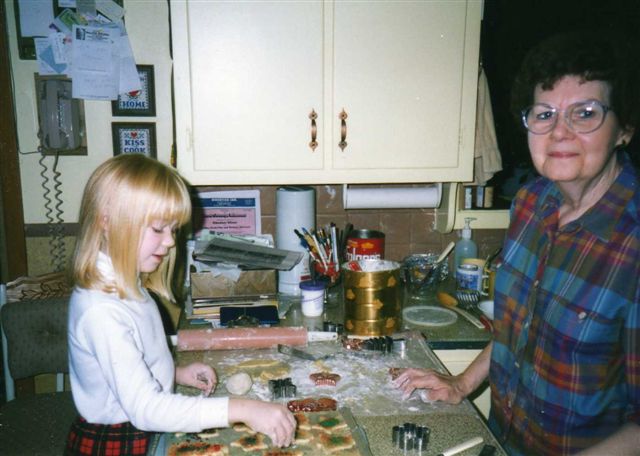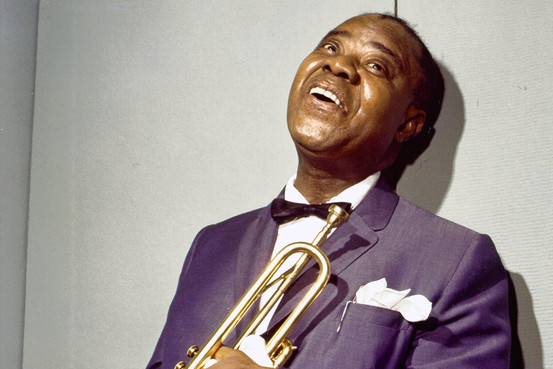“Communication is too alarming. To enter into someone else’s life is too frightening. To disclose the poverty within us is too fearsome a possibility.”
Harold Pinter, “Writing for the Theatre”
Archives for November 2012
TT: What child is this?
Most of us outlive our parents, and once we do, the winter holidays become, among many other things, a reminder of what we’ve lost. Perhaps those who had unhappy childhoods feel differently, but when I was a boy, the holidays were always a time of shadowless delight. Throughout my youth and long past it, my mother’s family, which was both large and close, gathered at my grandmother’s house to celebrate Thanksgiving and Christmas Eve at groaning tables full of savory goodies. Now those days are gone.
 I wrote at length about my family’s holiday rituals in “My Mother’s People,” a chapter of the memoir of my childhood and youth that I published in 1991, back when those rituals were still very much a thing of the present:
I wrote at length about my family’s holiday rituals in “My Mother’s People,” a chapter of the memoir of my childhood and youth that I published in 1991, back when those rituals were still very much a thing of the present:
Not long after Thanksgiving, my mother would spend the better part of a Saturday afternoon making Christmas cookies and filling two round aluminum tins with dark brown squares of homemade chocolate fudge so rich that we were allowed to eat only one piece at a sitting. David and I cut the sticky cookie dough into stars and bells and silhouettes of Santa Claus and lovingly laid each piece on a greased cookie sheet. The Santa Claus cookies were special, for I took Santa Claus seriously. I left him a glass of milk and a plate of Christmas cookies before going to bed on Christmas Eve, and they were gone by sunup….
Long after my brother and I had grown up, my mother kept on making fudge and baking cookies in November, assisted not by us but by my niece Lauren, and each year we ate them with a pleasure that had at least as much to do with the memories that they embodied as with the way that they tasted. She did so for as long as she possibly could, but the time finally came when she grew too feeble to cook anything more ambitious than a TV dinner, and last winter she spent the holidays in a nursing home, sick unto death and longing for the merciful deliverance that finally came to her in the spring. Though the rest of us opened presents at home that Christmas morning, we were doing nothing more than going through the motions of what had previously been a vibrant, blessed occasion.
Now I’m on my own, and Mrs. T and I went to Connecticut last week to eat Thanksgiving dinner with the members of her family, to whom I’ve become comfortingly close. It was, I’m happy to say, a glorious day, festive and celebratory. We’ll be with them again on Christmas, and we’ll put up our own Christmas tree in Connecticut for the first time in far too many years. After my mother’s health began to deteriorate, we made a special point of flying out to Smalltown, U.S.A., to spend each Christmas with her, and so we gave up having our own trees until now.
 It will, of course, be truly wonderful to raise a tree in our own living room this year, for it will serve as a glittering symbol of the strong and enduring joy that Mrs. T and I, against all odds, have found in one another in the middle of our lives. We have much to be thankful for, and we know it. But as we trim the tree, I have little doubt that I’ll also be thinking of a parade of Christmases long past, and that I’ll hear Dave Frishberg’s “The Difficult Season” in my mind’s ear:
It will, of course, be truly wonderful to raise a tree in our own living room this year, for it will serve as a glittering symbol of the strong and enduring joy that Mrs. T and I, against all odds, have found in one another in the middle of our lives. We have much to be thankful for, and we know it. But as we trim the tree, I have little doubt that I’ll also be thinking of a parade of Christmases long past, and that I’ll hear Dave Frishberg’s “The Difficult Season” in my mind’s ear:
The difficult season
Can bring us to tears too much,
Touching on feelings and fears
Too tender to ever touch.
The tinsel, the reindeer, the chimney, the sleigh
Are the innocent dreams of an innocent day.
We hark to the carols meek and mild,
Awaking the memories of yesterday’s child.
TT: Satchmo on the air
John Douglas Thompson and I figure prominently in a well-produced ten-minute audio profile of Louis Armstrong that aired over the weekend on WRTI, Philadelphia’s classical and jazz radio station. The occasion was the Wilma Theater run of Satchmo at the Waldorf, which runs in Philly through Sunday. To listen to the piece, go here.
In case you didn’t see “Writing Satchmo at the Waldorf,” last week’s Wall Street Journal online video feature, here it is:
TT: Just because
An excerpt from the 1978 TV version of Harold Pinter’s No Man’s Land, starring John Gielgud and Ralph Richardson:
(This is the latest in a series of arts-related videos that appear in this space each Monday and Wednesday.)
TT: Almanac
“The speech we hear is an indication of that which we don’t hear. It is a necessary avoidance, a violent, sly, and anguished or mocking smoke screen which keeps the other in its true place.”
Harold Pinter, “Writing for the Theatre”
KID STUFF AT THE CLARK ART INSTITUTE
“Most Americans take it for granted, as well they should, that in a democracy, the experience of going to an art museum should be made more widely accessible. But any museum that starts down the twisty road of cultural democratization can lose sight of its overarching mission…”
TT: One from the home team
 The Wall Street Journal, which usually stands mute when it comes to the extramural activities of its own contributors, decided to take note of Satchmo at the Waldorf today:
The Wall Street Journal, which usually stands mute when it comes to the extramural activities of its own contributors, decided to take note of Satchmo at the Waldorf today:
The reviews of Terry Teachout’s one-man play “Satchmo at the Waldorf” share two common elements. They start with some version of the following: “It takes a brave theater critic to write a play.” And then they quickly proceed to some version of “It’s a great show.”…
Read the whole thing here.
* * *
A Wall Street Journal-produced video about Satchmo at the Waldorf:
TT: Once more, with production numbers
In today’s Wall Street Journal I report favorably on two new shows, the musical version of A Christmas Story (surprise!) and Christopher Durang’s Vanya and Sonia and Masha and Spike. Here’s an excerpt.
* * *
 Recipe for a successful commodity musical: (1) Obtain the stage rights to a well-liked film. (2) Write a script that sticks close to the original plot, so as not to upset the public. (3) Add safe, uninteresting songs and fancy sets and costumes. (4) Sit back and count the money. This, of course, is also a sure-fire recipe for a dull show, which is why commodity musicals are a blight on Broadway. Once in a while, though, the odd thing happens. “A Christmas Story,” the stage version of Bob Clark’s charming 1983 film about Ralphie, a sweet little kid from Indiana who longs to find an Official Red Ryder Carbine-Action Two-Hundred-Shot Range Model Air Rifle under the tree on Christmas morning, ought by all rights to be tedious in the extreme–but it isn’t. Some of it, in fact, is really good, and none of it is less than watchable.
Recipe for a successful commodity musical: (1) Obtain the stage rights to a well-liked film. (2) Write a script that sticks close to the original plot, so as not to upset the public. (3) Add safe, uninteresting songs and fancy sets and costumes. (4) Sit back and count the money. This, of course, is also a sure-fire recipe for a dull show, which is why commodity musicals are a blight on Broadway. Once in a while, though, the odd thing happens. “A Christmas Story,” the stage version of Bob Clark’s charming 1983 film about Ralphie, a sweet little kid from Indiana who longs to find an Official Red Ryder Carbine-Action Two-Hundred-Shot Range Model Air Rifle under the tree on Christmas morning, ought by all rights to be tedious in the extreme–but it isn’t. Some of it, in fact, is really good, and none of it is less than watchable.
“A Christmas Story,” mind you, follows the recipe in every way. Nothing happens in the show that doesn’t happen in the film, all of the now-familiar plot twists are present and accounted for, the members of the cast endeavor mightily to suggest the well-remembered performances of their cinematic counterparts, and the reassuringly obvious song titles include “A Major Award,” “Red Ryder Carbine Action BB Gun” and “You’ll Shoot Your Eye Out!”
So what works? Quite a lot, actually, starting with the staging. John Rando is a scintillating musical-comedy director–his “Guys and Dolls,” mounted last year at Massachusetts’ Barrington Stage, was the best revival of that classic musical that I’ve ever seen–and he and Warren Carlyle, the choreographer, infuse “A Christmas Story” with plenty of liveliness and flair….
 Christopher Durang writes comedies with stiletto-sharp stings in the tail, some of which are devastatingly funny and others exasperatingly messy. “Vanya and Sonia and Masha and Spike” is one of the former, an inside-out medley of Chekhov’s Greatest Hits in which key moments from the Russian playwright’s oeuvre are scrambled into a camp cartoon about a melancholy Pennsylvania family whose members (Kristine Nielsen, David Hyde Pierce and Sigourney Weaver) were named by their theater-loving parents after characters from “Three Sisters” and “Uncle Vanya.” The trick up Mr. Durang’s sleeve is that the play’s onstage lunacy is the distorted outward manifestation of the deep-seated sorrows of its protagonists, especially Sonia (Ms. Nielsen), a sad sack who gets her biggest laughs simply by telling the awful truth about her unfulfilled life: “My relationships with men have been limited to ‘Here’s your change, ma’am’ at the supermarket.”
Christopher Durang writes comedies with stiletto-sharp stings in the tail, some of which are devastatingly funny and others exasperatingly messy. “Vanya and Sonia and Masha and Spike” is one of the former, an inside-out medley of Chekhov’s Greatest Hits in which key moments from the Russian playwright’s oeuvre are scrambled into a camp cartoon about a melancholy Pennsylvania family whose members (Kristine Nielsen, David Hyde Pierce and Sigourney Weaver) were named by their theater-loving parents after characters from “Three Sisters” and “Uncle Vanya.” The trick up Mr. Durang’s sleeve is that the play’s onstage lunacy is the distorted outward manifestation of the deep-seated sorrows of its protagonists, especially Sonia (Ms. Nielsen), a sad sack who gets her biggest laughs simply by telling the awful truth about her unfulfilled life: “My relationships with men have been limited to ‘Here’s your change, ma’am’ at the supermarket.”
Not only does Ms. Nielsen have the best part, but she gives the best performance of the evening, the high point of which is a phone-call monologue that is as smartly written as any of Mr. Durang’s glittering comic sketches….
* * *
Read the whole thing here.
A preview of the Lincoln Center Theater production of Vanya and Sonia and Masha and Spike:
